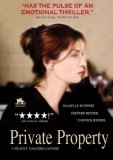| Reviews & Columns |
|
Reviews DVD TV on DVD Blu-ray 4K UHD International DVDs In Theaters Reviews by Studio Video Games Features Collector Series DVDs Easter Egg Database Interviews DVD Talk Radio Feature Articles Columns Anime Talk DVD Savant Horror DVDs The M.O.D. Squad Art House HD Talk Silent DVD
|
DVD Talk Forum |
|
|
| Resources |
|
DVD Price Search Customer Service #'s RCE Info Links |
|
Columns
|
|
|
Private Property
New Yorker Video // Unrated // September 11, 2007
List Price: $29.95 [Buy now and save at Amazon]
Private Property, a Belgian film from director Joachim LaFosse, isn't a simple film to process. Grinding family conflict, brusque sexual dialogue between parents and children, and exceedingly wrathful motives plague this story. Divorce can be quite degenerative in itself to everyone around it, especially under apt circumstances. LaFosse has crafted an unsettling portrait of a family under such measures, and has done so with muted rage and surprising tension.
The Film:
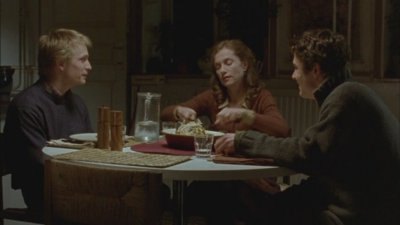
Pascale (Isabelle Huppert) is a recently-divorced mother of two post-teenage boys, Thierry (Jeremie Renier) and Francois (Yannick Renier). Her divorce to her husband was clearly not a pretty one, as indicative of his visits to their cottage to make regular payments. In fact, the house they live in was given to the boys by their father as far as he is concerned, yet Pascale is "allowed" to live there. Her relationship differs between the boys; she shares a nurturing and soft relationship with the eldest Francois, while she and Thierry breach on fisticuffs on a regular basis. Fighting ensues over just about everything in the house, primarily rooted in Thierry's anger. When Pascale makes a decision to run off with her newly beloved admirer and sell "her" cottage to start a business, tension rapidly mounts into a volcano of emotion within this dilapidated trio.
Private Property is a taut and challenging character drama about the imploding nature of divorce. It's a film that makes it exceedingly difficult to find anything admirable inside any of our core characters. LaFosse's film treads dangerously along the line of discomfort and intrigue, but manages not to push too hard in either direction. What results is an intimate level of familial terseness simmering and ready to erupt at any moment. Taking place primarily in a wispy cottage in the outskirts of town, most of the conflict stays within very close quarters that can rapidly fill with hostility. Small conflicts, like disagreements over the usage of their only car, boil into physically escalated incidents within the crumbling family. Private Property plays on remotely similar themes as Baumbach's The Squid and the Whale, but stands completely devoid of humorous quirk or intellectual critique. It's cold, volatile and, at times, very intense.
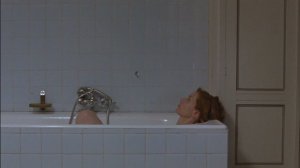
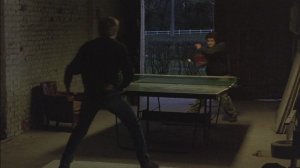
There's a peculiar family dynamic going on here that seems firmly rooted in the mother's weakness and the boy's fraught anger, both internal and external, with her decisions. We see two late teen - early twenties brothers bathing together, washing each other's hair and discussing their testosterone-induced activities, then shortly after belligerently making fun of their mother's sexual escapades in shameless fashion. The mother, in contrast, asks for lingerie advice from her sons that attracts unsavory comments and, later on, scathing insults about her hairstyle. These aren't isolated incidents, but more like the regular activity that gets brushed off in their household. Glimmers of this kind of glaring dynamic can be caught in more aggressive and grating dramas, but not often on the quaint terms that Private Property comes with.
A lot of this successful evocation hinges on the strong performance from Isabelle Huppert and the explosive rapport between the twins, played by real-time brothers Yannick and Jeremie Renier. Between the three of them, they create a dynamically obscure demeanor that suffers a bit from that "watching a train wreck" syndrome - it's difficult to pull your eyes away from their collapse. Each brother harnesses intricately defined characteristics; Yannick Renier takes on a tender mother's boy persona in Francois, while the electric Jeremie, who reminds me a bit of a young Daniel Craig, gives Thierry a natural fiery attitude. Though we don't have a set positive character in the film, Thierry works great as our fuming antagonist and problematic root. Both of the brothers gave their textual conflict, which holds an almost unnaturally heightened level of friction between them, an air of frank tangibility.
Isabelle Huppert, however, proves to be the most compelling of characters in her Pascale purely because of her convolution. Her motives and decisions are very warped and irrational, yet they also strike you with a sense of belief. She's undoubtedly not a heroine, not somebody to look upon with fondness. But she's compelling with her decisions. Huppert gives a bang-up performance in Pascale fluctuating persona, flushing between greed and anger to unquenchable love and desire. She handles it with facial stoicism, yet with bodily fervor.
You watch a lot of facial and physical expression in Private Property. If you were to sweep away the language track and flesh LaFosse's film out as a silent piece, it would stand just as strong purely on physical projection. Most of the scenes capture at least two, most times three, of the characters at a time. We're given ample opportunity to see this family's chess game of provocation, seeing exactly what triggers each character. Private Property communicates with you in its bleak, wispy manner through vigorous tension that's about as thick as the landscape's foggy air.
The DVD:
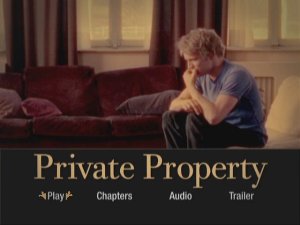
New Yorker brings up Private Property in a standard keepcase DVD with a great booklet featuring interviews from LaFosse and the Renier brothers, and a Q & A with director LaFosse.
The Video:
Presented in a somewhat dull anamorphic widescreen image, Private Property doesn't look too shabby. It has a cold haze about the picture, but it's fitting for the film. There's a lot of muted, plain color at work here, and it all looks fine. Print damage didn't seem too noticeable at any points during the film, as did any other real digital problems. There's a bit of graininess sporadically and some weak black levels, but nonetheless the image serves its purpose for a non-visual piece. Details and facial expressions can be made out just fine, and that's what important.
The Audio:
Though the sound gets slapped with a Dolby 5.1 surround label, it doesn't really try to use the surround capabilities much. That's just fine, though, since we're not working with a lot of sound effects or ambience anyway. The French dialogue, however, sounds appropriately strong, as did some minor sound effects like pellet gun shots and ping-pong ball bounces. A Dolby 2.0 track is also available, as are exceedingly solid English subtitles.
The Extras:
A Trailer and Scene Selection are all we're working with. You'll have to resort to pulling out the included booklet for a bit of insight from the actors and director.
------
Final Thoughts:
The quality of the character infuriation and the achievement in emotional tautness within Private Property make this film well worth seeing. It's a difficult film to recommend, however. Though all the performances are inexplicably entrancing, it's not one I could revisit too many times. Private Property receives a sizeable recommendation for those who find familial chaos to be an engaging topic. Others will probably want to Rent It to gauge and see if these strong actors and actress speak to you with enough strength to delve back into the fire. LaFosse's film is worth a viewing, without a doubt, but not with too much frequency.
Thomas Spurlin, Staff Reviewer -- DVDTalk Reviews | Personal Blog/Site
The Film:

Pascale (Isabelle Huppert) is a recently-divorced mother of two post-teenage boys, Thierry (Jeremie Renier) and Francois (Yannick Renier). Her divorce to her husband was clearly not a pretty one, as indicative of his visits to their cottage to make regular payments. In fact, the house they live in was given to the boys by their father as far as he is concerned, yet Pascale is "allowed" to live there. Her relationship differs between the boys; she shares a nurturing and soft relationship with the eldest Francois, while she and Thierry breach on fisticuffs on a regular basis. Fighting ensues over just about everything in the house, primarily rooted in Thierry's anger. When Pascale makes a decision to run off with her newly beloved admirer and sell "her" cottage to start a business, tension rapidly mounts into a volcano of emotion within this dilapidated trio.
Private Property is a taut and challenging character drama about the imploding nature of divorce. It's a film that makes it exceedingly difficult to find anything admirable inside any of our core characters. LaFosse's film treads dangerously along the line of discomfort and intrigue, but manages not to push too hard in either direction. What results is an intimate level of familial terseness simmering and ready to erupt at any moment. Taking place primarily in a wispy cottage in the outskirts of town, most of the conflict stays within very close quarters that can rapidly fill with hostility. Small conflicts, like disagreements over the usage of their only car, boil into physically escalated incidents within the crumbling family. Private Property plays on remotely similar themes as Baumbach's The Squid and the Whale, but stands completely devoid of humorous quirk or intellectual critique. It's cold, volatile and, at times, very intense.


There's a peculiar family dynamic going on here that seems firmly rooted in the mother's weakness and the boy's fraught anger, both internal and external, with her decisions. We see two late teen - early twenties brothers bathing together, washing each other's hair and discussing their testosterone-induced activities, then shortly after belligerently making fun of their mother's sexual escapades in shameless fashion. The mother, in contrast, asks for lingerie advice from her sons that attracts unsavory comments and, later on, scathing insults about her hairstyle. These aren't isolated incidents, but more like the regular activity that gets brushed off in their household. Glimmers of this kind of glaring dynamic can be caught in more aggressive and grating dramas, but not often on the quaint terms that Private Property comes with.
A lot of this successful evocation hinges on the strong performance from Isabelle Huppert and the explosive rapport between the twins, played by real-time brothers Yannick and Jeremie Renier. Between the three of them, they create a dynamically obscure demeanor that suffers a bit from that "watching a train wreck" syndrome - it's difficult to pull your eyes away from their collapse. Each brother harnesses intricately defined characteristics; Yannick Renier takes on a tender mother's boy persona in Francois, while the electric Jeremie, who reminds me a bit of a young Daniel Craig, gives Thierry a natural fiery attitude. Though we don't have a set positive character in the film, Thierry works great as our fuming antagonist and problematic root. Both of the brothers gave their textual conflict, which holds an almost unnaturally heightened level of friction between them, an air of frank tangibility.
Isabelle Huppert, however, proves to be the most compelling of characters in her Pascale purely because of her convolution. Her motives and decisions are very warped and irrational, yet they also strike you with a sense of belief. She's undoubtedly not a heroine, not somebody to look upon with fondness. But she's compelling with her decisions. Huppert gives a bang-up performance in Pascale fluctuating persona, flushing between greed and anger to unquenchable love and desire. She handles it with facial stoicism, yet with bodily fervor.
You watch a lot of facial and physical expression in Private Property. If you were to sweep away the language track and flesh LaFosse's film out as a silent piece, it would stand just as strong purely on physical projection. Most of the scenes capture at least two, most times three, of the characters at a time. We're given ample opportunity to see this family's chess game of provocation, seeing exactly what triggers each character. Private Property communicates with you in its bleak, wispy manner through vigorous tension that's about as thick as the landscape's foggy air.
The DVD:

New Yorker brings up Private Property in a standard keepcase DVD with a great booklet featuring interviews from LaFosse and the Renier brothers, and a Q & A with director LaFosse.
The Video:
Presented in a somewhat dull anamorphic widescreen image, Private Property doesn't look too shabby. It has a cold haze about the picture, but it's fitting for the film. There's a lot of muted, plain color at work here, and it all looks fine. Print damage didn't seem too noticeable at any points during the film, as did any other real digital problems. There's a bit of graininess sporadically and some weak black levels, but nonetheless the image serves its purpose for a non-visual piece. Details and facial expressions can be made out just fine, and that's what important.
The Audio:
Though the sound gets slapped with a Dolby 5.1 surround label, it doesn't really try to use the surround capabilities much. That's just fine, though, since we're not working with a lot of sound effects or ambience anyway. The French dialogue, however, sounds appropriately strong, as did some minor sound effects like pellet gun shots and ping-pong ball bounces. A Dolby 2.0 track is also available, as are exceedingly solid English subtitles.
The Extras:
A Trailer and Scene Selection are all we're working with. You'll have to resort to pulling out the included booklet for a bit of insight from the actors and director.
------
Final Thoughts:
The quality of the character infuriation and the achievement in emotional tautness within Private Property make this film well worth seeing. It's a difficult film to recommend, however. Though all the performances are inexplicably entrancing, it's not one I could revisit too many times. Private Property receives a sizeable recommendation for those who find familial chaos to be an engaging topic. Others will probably want to Rent It to gauge and see if these strong actors and actress speak to you with enough strength to delve back into the fire. LaFosse's film is worth a viewing, without a doubt, but not with too much frequency.
|
| Popular Reviews |
| Sponsored Links |
|
|
| Sponsored Links |
|
|
| Release List | Reviews | Shop | Newsletter | Forum | DVD Giveaways | Blu-Ray | Advertise |
|
Copyright 2024 DVDTalk.com All Rights Reserved. Legal Info, Privacy Policy, Terms of Use,
Manage Preferences,
Your Privacy Choices | |||||||









